The iPhone 5 Review
by Anand Lal Shimpi, Brian Klug & Vivek Gowri on October 16, 2012 11:33 AM EST- Posted in
- Smartphones
- Apple
- Mobile
- iPhone 5
Six Generations of iPhones: Performance Compared
Section by Anand Shimpi
Cross platform smartphone benchmarks are interesting, but they do come with their own sets of issues. Before we get to that analysis however, let's look at how the iPhone's performance has improved over the past six generations. Luckily Brian has a set of all of the iPhones so he was able to run a few tests on all of the devices, each running the latest supported OS.
We'll start with SunSpider 0.9.1, our trusty javascript performance test:
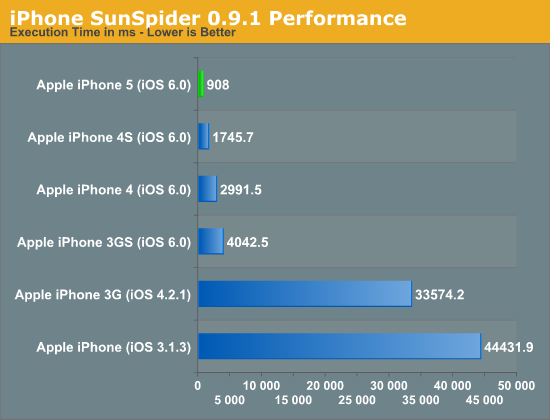
The transition from iPhone to iPhone 3G shows you just how much additional performance you can squeeze out of simply a software change. There's likely even more that could be squeezed out of that ARM11 platform, unfortunately newer versions of Safari/iOS aren't supported on the iPhone 3G so we're left with a runtime that's around 37x the length of a single run on the iPhone 5.
The rest of the devices support and run iOS 6, so we're at least on a level software playing field. The performance boost from one generation to the next is quite significant still. Going by this chart alone, the best balance of minimal upgrades and maximum perceived improvement would be from the original iPhone to the 3GS then again from the 3GS to the 5.
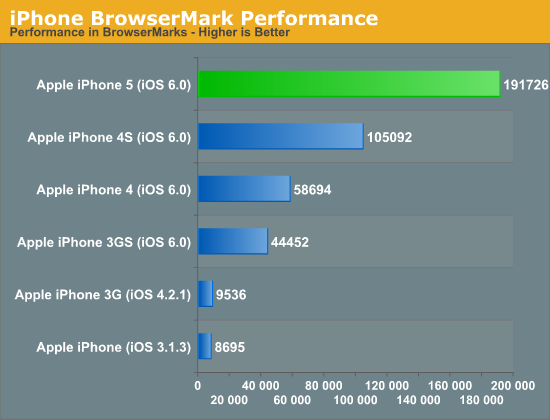
The BrowserMark results tell a similar story. The jump from the ARM11 based iPhone/iPhone 3G to the 3GS running iOS 6 is huge. Both the 4S and 5 offer doublings in performance, albeit for different reasons. The 4S delivered a doubling thanks to a doubling of core count and a move to the Cortex A9, while the iPhone 5 doubled performance through a much higher clock speed and microarchitectural improvements.
Finally we have Geekbench 2, which only runs on the iOS 6 supported devices so we say goodbye to the original iPhone and iPhone 3G:
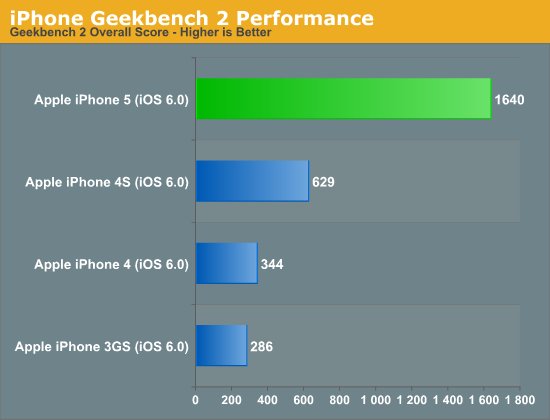
None of the jumps looks as dramatic as the move to the iPhone 5, but we already know why. The Swift CPU architecture does a great job improving memory performance, which shows up quite nicely in a lot of the Geekbench 2 subtests.
On the PC side we often talk about 20% performance improvements from one generation to the next being significant. It's clear that the mobile SoC space is still operating along a hyper Moore's Law curve. The rate of progress will eventually slow down, but I don't see that happening for at least another couple generations. The move to ARM's Cortex A15 will be met with another increase in performance (and a similarly large set of power challenges), and whatever comes next will push smartphones into a completely new category of performance.


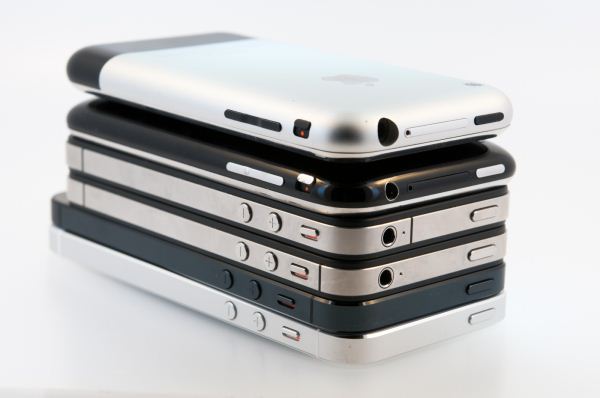
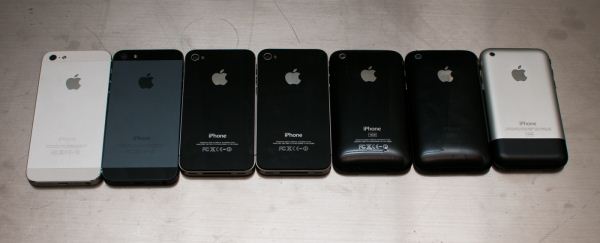








276 Comments
View All Comments
name99 - Wednesday, October 17, 2012 - link
If you want to read non-technical reviews, there are a million other sites you can go to, from NYT and WSJ to Engadget and TheVerge.The WHOLE POINT of people reading Anand's reviews is to get tech details we don't get elsewhere.
Perhaps as a followup you might want to suggest that John Siracusa in future limit his OSX reviews to a single letter-sized page?
rarson - Wednesday, October 17, 2012 - link
No, it's not the "WHOLE POINT," the whole point is that reviews are reviews and tech articles are tech articles.GotThumbs - Tuesday, October 16, 2012 - link
"Those longing for an HTC One X or Galaxy S 3 sized device running iOS are out of luck. "I find it hard to believe there is even one person that is in this group. Apple's walled garden is mostly OS and portal based (Itunes).
Especially with Apples maps being sub-standard.
Please stick to facts.
A5 - Tuesday, October 16, 2012 - link
If you don't want any editorial judgement or statements, there are plenty of places where you can just read a spec sheet and benchmark results.Omophorus - Tuesday, October 16, 2012 - link
I think the opposite is more likely... or at least I fall into that category.Mobile computing device aside, Android 4.0+ is shockingly much nicer to use (and this coming from a long time iPhone user) than iOS 5 or iOS6.
If I could get the iPhone 5 handset, maybe with slightly better anodization, running Android 4.0+ I'd be in hog heaven.
After playing with an iPhone 5, I really dig the hardware, but found the software woefully lacking.
crankerchick - Tuesday, October 16, 2012 - link
I think you and the original commenter missed what the statement was saying. It said, "HTC One X or Galaxy S3 'sized' device..."Specifically, a larger screen iPhone, is where I think they were going with the statement, especially given the context of the paragraph where the statement was made.
That said, I'm very much in the same camp as you. My number one device would be an iPhone-size and iPhone-build device running Android (but with a few tweaks since we are talking the ideal device). In fact, that is part of the reason I have an iPhone now and my Galaxy Nexus is sitting in a drawer by the bed--it's just too big and battery life is awful. I want a 4-4.2" 720p screen that doesn't have last year's hardware inside. The One S comes closest, but it's not on VZW to my knowledge, and it's still not "the best" hardware available, which you need with Android, especially on a manufacturer's skinned device.
perpetualdark - Monday, October 22, 2012 - link
What about the Incredible 4g? I think this phone was overlooked because of it's proximity to the S3 release and the fact that the market is generally trending toward a nearly 5" display..I like this phone because it has the current generation of technology, is pretty darn thin, has a replaceable battery, has the 4" display (ie I am not holding a small tablet to my ear or carrying it in my pocket), and is, more importantly, android.
Yes, the SLCD display may not be quite what the apple display is on paper, but to be perfectly honest, I have never noticed the differences.. Perhaps in a test environment, or to someone who calibrates displays all day, the Apple display would be better, I just don't see it.
The s4 processor is not only fast, but plenty efficient, and the battery lasts easily 2 full days of heavy use. I can use it to read a kindle book for 6-8 hours over 2 days, talk a few hours, surf the web a few dozen times, text a few hundred texts, and even play games for an hour or two before I run out of battery. I have yet to go below 40% in one 24 hour period of time with the exception of using it with GPS and maps up.. the gps on 100% burns up the battery fast.
gig of ram, 8 gigs on board storage, 32 more gigs with the sd card, etc, plenty of storage. 8 megapixal camera on back and a vga camera on front.
ICS, LTE, Beats Audio, pretty much all the latest in tech..
No, it can't quite compete with the S3, but it is pretty close to a One X in a 4" package and the closest thing to a One X you can get from Verizon, and honestly the phone that SHOULD be compared to the iphone5, given it is the only one with the current generation of hardware that is the same size. Sure, the iphone5 has an edge on the inc 4g in terms of tech specs, but when you add cost to the mix, the playing field is more level there as well, and to be honest, in real world applications the differences are going to amount to very small percentages.
What people really want is a phone that fits their needs. Usually the most important things are screen size, OS preference, cost, and battery life. Performance is ONLY an issue when there is a problem with it.. Like when the iphone 4 dropped calls and couldn't do internet when you touched it.. The difference from the S4 to the A6 in real world application is a second or two in loading an app.. if even that.. most of my apps open instantly and with chrome and a good 4G connection I am betting that side by side loading web pages would be nearly identical. Specs are cool when comparing e-peen size but otherwise don't mean much in application.
Not everyone is interested in big screens for a phone. Not everyone is interested in having a flexible OS. Not everyone is interested in the latest tech. Not everyone wants to spend a fortune on a phone that is, in practice, marginally better than what they have already. Not everyone is interested in bleeding edge technology. Sometimes you are looking for the phone that best suits YOUR needs. For me, that is an android platform, small form factor to fit in my front pocket comfortably as well as in my hand. A processor that was fast but power conservative. A battery that lasted a full day with reserve to spare, and could be used for 2 or 3 days if conserved well, AND could be swapped with a fully charged battery when travelling. I also like a phone that I can drop and scratch and not notice the dings and scratches.. since I put it in my pocket, I don't want to add a bulky case to keep it safe.. (I have dropped this phone dozens of times and 24" away you would never know it). I like to only pay $6.99 for insurance and be able to replace it if lost or stolen or broken for less than $100 ($12 per month for apple with $170 replacement deductible). And I like that I can use ANY micro-usb charger or cable to charge or connect to a computer. I don't have to buy any special adapters to make it work with my existing devices.
Quite frankly, I think the difference between an android fan and an apple fan is that an android fan will not settle for the one device available to suit his needs, he will shop around to find the RIGHT one. If that happens to be an iphone, that is what he will get. But with dozens of models to choose from that are every bit as good if not better in every way that really matters, the chances of going with an iphone are pretty slim. An apple fan will settle for what is available and try to convince everyone around him that this one device will fit everyone's needs perfectly without exception.
crankerchick - Tuesday, October 16, 2012 - link
I don't follow all the technicals like that, I'm more of an end user when it comes to mobile technology, but I think the trend towards the larger screens is more the MFRs pushing that a selling point (moar moar moar) to cover the fact that they can't fit the latest and greatest and cutting edge (NFC, quad core, LTE, etc) in the chassies of a 4" screen phone.Just my hunch. Wouldn't mind being schooled on this by someone in the know.
KPOM - Tuesday, October 16, 2012 - link
I'd agree with that assessment. Apple was one of the last to move to 3G and one of the last to move to LTE because of battery life. The other manufacturers got around it by building thicker phones in the 3G era, and then with the LTE era started putting in bigger screens, which gave them room for bigger batteries (though the larger displays also required more power). It turned out enough people liked the bigger screens.Now that the power consumption levels are down, it will be interesting to see if others shrink their screens back down to Apple levels. The Galaxy SIII Mini is a half-hearted attempt, as it lacks LTE and has mediocre specs. But maybe someone else will take the bait.
rarson - Thursday, October 18, 2012 - link
I feel like the iPhone 5 screen is actually too small (and I've heard complaints that the phone is too light, which I sort of agree with as well), but I think the Galaxy S3 is too big. I'm still using a Verizon Fascinate. It's got a bigger screen than the 5, but it's a bit smaller than the S2 and S3, perfect size. Thin but not too thin, and light but not too light. In fact, all I really want is a phone exactly like it, but with more power, better battery life, and maybe a slightly better screen (can't complain too much about the screen I already have).When I picked up the Fascinate, I knew it was the phone I wanted (helps that the price was only $50). When the S2 came out, I was excited to see it but disappointed by how much bigger the phone had gotten. I don't want a phone that I have to contort to get into my pocket. Apple's iPhone 5 is great in that respect, but after using this Fascinate for so long, its small size feels a bit cramped.
I'd love to have the hardware of the Apple phone, but proprietary connectors and iOS are absolutely a no-go for me. I really don't care for iOS at all, because Android is so much easier to use.